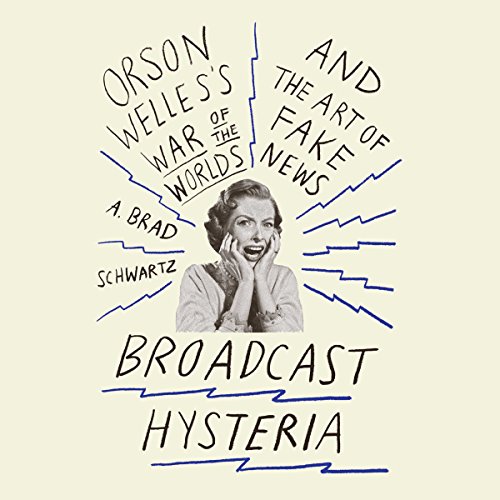
Broadcast Hysteria
Orson Welle's War of the Worlds and the Art of Fake News
No se pudo agregar al carrito
Add to Cart failed.
Error al Agregar a Lista de Deseos.
Error al eliminar de la lista de deseos.
Error al añadir a tu biblioteca
Error al seguir el podcast
Error al dejar de seguir el podcast
3 meses gratis
Compra ahora por $25.79
No default payment method selected.
We are sorry. We are not allowed to sell this product with the selected payment method
-
Narrado por:
-
Sean Runnette
-
De:
-
A. Brad Schwartz
In Broadcast Hysteria, A. Brad Schwartz examines the history behind the infamous radio play. Did it really spawn a wave of mass hysteria? Schwartz is the first to examine the hundreds of letters sent directly to Orson Welles after the broadcast. He draws upon them, and hundreds more sent to the FCC, to recapture the roiling emotions of a bygone era, and his findings challenge conventional wisdom. Relatively few listeners believed an actual attack was underway. But even so, Schwartz shows that Welles's broadcast prompted a different kind of "mass panic" as Americans debated the bewitching power of the radio and the country's vulnerabilities in a time of crisis.
Schwartz's original research, gifted storytelling, and thoughtful analysis make Broadcast Hysteria a groundbreaking work of media history.
©2015 A. Brad Schwartz (P)2015 HighBridge, a division of Recorded BooksListeners also enjoyed...




















It is also a lot about the state of radio broadcasting in 1938. And it weaves in quite a bit of biographical detail about Orson Wells. There is also quite a bit about the so-called "panic" associated with the broadcast. To what extent was this panic real? Who was most susceptible to being frightened, and why? The book also looks at how the broadcast changed radio in the following years.
The book feels very relevant in our modern age when fake news is constantly bombarding us, especially online. I can see this book being required reading in a college-level media studies class. If I was a student in such a class, this would probably be one of my favorite books on the reading list.
I noticed one review of this book that claimed it is overly repetitive. I would have never come up with that claim, but I guess I can see how some readers might feel that way. The book returns again and again to certain themes as it looks at the broadcast from different angles: The audience for the broadcast was small. The number of people who were frightened was smaller still. The number who truly panicked was probably tiny. Almost anyone could have been frightened by the broadcast, given the right circumstances, like tuning in late, or hearing about the broadcast from another frightened person.
Overall, a very interesting and educational read. Highly recommended, especially if you already have an interest in the topic.
A very interesting book. Better than expected.
Se ha producido un error. Vuelve a intentarlo dentro de unos minutos.
Kinda interesting but incredibly repetitive
Se ha producido un error. Vuelve a intentarlo dentro de unos minutos.



